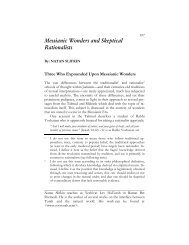Is There a Disconnect between Torah Learning and ... - Hakirah.org
Is There a Disconnect between Torah Learning and ... - Hakirah.org
Is There a Disconnect between Torah Learning and ... - Hakirah.org
You also want an ePaper? Increase the reach of your titles
YUMPU automatically turns print PDFs into web optimized ePapers that Google loves.
30 : Hạkirah, the Flatbush Journal of Jewish Law <strong>and</strong> Thought<br />
expressed these thoughts clearly many times over. As they tell us:<br />
28<br />
, a person should live in proximity to his rebbe,<br />
because having his rebbe as a role model will serve to dissuade him<br />
שותא דינוקא בשוקא או from negative behaviors. Similarly, Chazal tell us<br />
29<br />
, “The speech of a child in the street reflects what he<br />
hears from either his father or his mother.”<br />
לעולם ידור אדם במקום רבו<br />
דאבוה או דאימיה<br />
How We Speak:<br />
It is not only of our general behavior that we must be careful. We<br />
must also take care when admonishing or castigating our children for<br />
their improper behavior. Uncontrolled <strong>and</strong> unbridled anger, even<br />
when seemingly justified, usually fails to improve the child’s behavior.<br />
Instead it engenders contempt <strong>and</strong> disrespect for the admonishing<br />
parent or teacher. Even worse, it provides the child with a negative<br />
role model for how to communicate.<br />
' "ז The Chazon <strong>Is</strong>h in<br />
writes: 30<br />
אמונה ובטחון פרק ד<br />
אות ט<br />
כאשר מיסר הרב את תלמידו בביטוי גס וזעקת רוגז על העוול אשר עשה,<br />
מתערב כאן רע וטוב, אם יש כאן תועלת תוכחה והחניך מתעורר על חטאו<br />
וגומר בלבו שלא לשנות חטא זה, [לעומת זה] יש כאן ענין רע שהחניך מתרגל<br />
בגסות ובקפדנות המקבל מרבו שרואהו משמש במגונות אלו בעת תוכחתו,<br />
וגדול שמשה יותר מלמודה, והתלמיד מחקה תמיד את רבותיו, ועל הרוב גם<br />
התוכחה לקויה כשמתלוה עמה ממדות הלא טובות.<br />
When a teacher admonishes a child using a coarse expression <strong>and</strong><br />
enraged screaming regarding the wrong that the student<br />
committed, there is a mixture of good <strong>and</strong> bad. <strong>There</strong> may be a<br />
positive gain of admonishment <strong>and</strong> the student becomes aware of<br />
the wrongness of his transgression <strong>and</strong> makes up his mind never to<br />
repeat it. [On the other h<strong>and</strong>] there is a negative aspect to this in<br />
that the student gets used to the coarseness <strong>and</strong> the impatience that<br />
he is receiving from his teacher, whom he sees using all of these as<br />
he admonishes him. And its application <strong>and</strong> practice is greater<br />
than its learning (i.e., watching a teacher applying <strong>Torah</strong> in his life<br />
ברכות ח ע 28<br />
סוכה נו ע 29<br />
. , "א<br />
. "ב<br />
30 Rebbe Yosef Yitzchok Schneerson, the Lubavitcher Rebbe ztz”l, writes<br />
very much the same in the Klalei HaChinuch ve’ha’Hadracha, p. 28 in the<br />
edition published by Yekuthiel Green of Kfar ChaBaD.
















